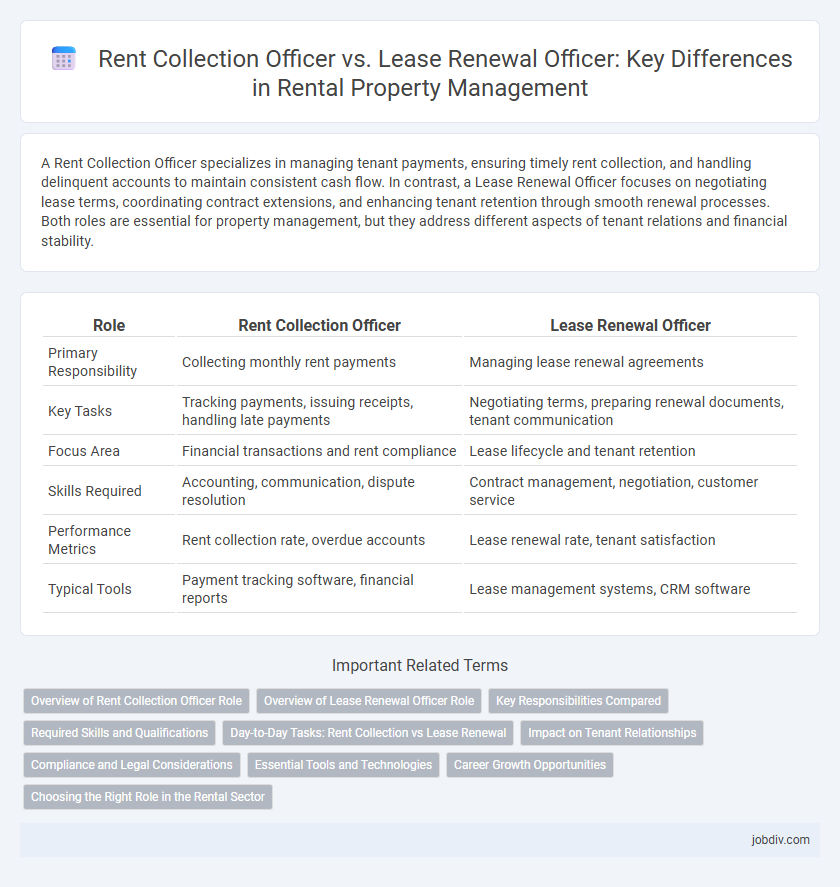A Rent Collection Officer specializes in managing tenant payments, ensuring timely rent collection, and handling delinquent accounts to maintain consistent cash flow. In contrast, a Lease Renewal Officer focuses on negotiating lease terms, coordinating contract extensions, and enhancing tenant retention through smooth renewal processes. Both roles are essential for property management, but they address different aspects of tenant relations and financial stability.
Table of Comparison
| Role | Rent Collection Officer | Lease Renewal Officer |
|---|---|---|
| Primary Responsibility | Collecting monthly rent payments | Managing lease renewal agreements |
| Key Tasks | Tracking payments, issuing receipts, handling late payments | Negotiating terms, preparing renewal documents, tenant communication |
| Focus Area | Financial transactions and rent compliance | Lease lifecycle and tenant retention |
| Skills Required | Accounting, communication, dispute resolution | Contract management, negotiation, customer service |
| Performance Metrics | Rent collection rate, overdue accounts | Lease renewal rate, tenant satisfaction |
| Typical Tools | Payment tracking software, financial reports | Lease management systems, CRM software |
Overview of Rent Collection Officer Role
A Rent Collection Officer manages the process of collecting rent payments, ensuring timely transactions, and maintaining accurate financial records for rental properties. They resolve payment discrepancies and communicate with tenants to address overdue rent or payment plans, supporting property cash flow stability. Their role is crucial in minimizing arrears and enhancing landlord-tenant relationships through effective rent management.
Overview of Lease Renewal Officer Role
The Lease Renewal Officer manages lease contract extensions, ensuring timely renewals and minimizing vacancy periods. This role involves coordinating with tenants to negotiate lease terms, maintaining accurate lease records, and collaborating with property management teams to optimize tenant retention. Effective lease renewal processes contribute to sustained cash flow and improved occupancy rates for rental properties.
Key Responsibilities Compared
A Rent Collection Officer primarily manages and enforces timely rent payments, tracks outstanding balances, and handles tenant payment disputes to maintain steady cash flow. A Lease Renewal Officer focuses on negotiating lease extensions, updating contract terms, and coordinating with tenants to secure continued occupancy. Both roles are essential in rental property management but differ fundamentally in financial enforcement versus contract continuity.
Required Skills and Qualifications
A Rent Collection Officer requires strong financial management skills, proficiency in accounting software, and excellent communication to handle timely rent payments and resolve payment issues. A Lease Renewal Officer must possess negotiation skills, knowledge of lease agreements, and customer service expertise to effectively manage lease renewals and maintain tenant relations. Both roles typically require a background in property management, attention to detail, and familiarity with relevant laws and regulations.
Day-to-Day Tasks: Rent Collection vs Lease Renewal
Rent Collection Officers primarily focus on monitoring tenant payments, issuing invoices, and following up on overdue rents to ensure consistent cash flow for property management. Lease Renewal Officers handle lease agreement negotiations, prepare renewal documentation, and communicate with tenants to secure contract extensions and maintain occupancy rates. Both roles require detailed record-keeping and tenant communication but differ in their emphasis on financial transactions versus contractual obligations.
Impact on Tenant Relationships
Rent Collection Officers maintain tenant relationships by ensuring timely payments, which fosters trust and financial stability in rental agreements. Lease Renewal Officers influence tenant retention through clear communication and negotiation skills, enhancing satisfaction and long-term occupancy. Both roles are critical in cultivating positive interactions that support seamless tenancy experiences.
Compliance and Legal Considerations
Rent Collection Officers ensure timely payment enforcement and adherence to lease agreements by monitoring rent schedules and managing delinquent accounts to maintain financial compliance. Lease Renewal Officers focus on legal considerations by reviewing lease terms, updating contracts to reflect current regulations, and obtaining tenant consent for renewals, minimizing legal risks. Both roles require thorough knowledge of local housing laws and tenant rights to ensure organizational compliance and reduce liabilities.
Essential Tools and Technologies
Rent Collection Officers rely heavily on property management software and automated payment platforms to efficiently track rent payments and send timely reminders. Lease Renewal Officers utilize digital lease management systems and customer relationship management (CRM) tools to streamline renewal processes and maintain tenant communication. Both roles benefit from mobile apps and cloud-based databases to enhance accessibility and real-time data updates.
Career Growth Opportunities
Rent Collection Officers primarily gain expertise in financial management and tenant relations, paving the way for advancement into senior accounting or property management roles. Lease Renewal Officers develop strong negotiation and contract management skills, positioning themselves for careers in leasing management or real estate portfolio management. Both roles offer distinct pathways for professional growth within the property rental industry, catering to different strengths and career aspirations.
Choosing the Right Role in the Rental Sector
Rent Collection Officers specialize in managing timely rent payments, ensuring cash flow stability and reducing delinquencies for property owners. Lease Renewal Officers focus on negotiating lease terms and securing tenant retention to minimize vacancy rates. Selecting the right role depends on whether the priority is financial consistency through rent collection or long-term occupancy through lease management.
Rent Collection Officer vs Lease Renewal Officer Infographic

 jobdiv.com
jobdiv.com